new posts in all blogs
Viewing: Blog Posts Tagged with: Sue Purkiss, Most Recent at Top [Help]
Results 1 - 17 of 17
How to use this Page
You are viewing the most recent posts tagged with the words: Sue Purkiss in the JacketFlap blog reader. What is a tag? Think of a tag as a keyword or category label. Tags can both help you find posts on JacketFlap.com as well as provide an easy way for you to "remember" and classify posts for later recall. Try adding a tag yourself by clicking "Add a tag" below a post's header. Scroll down through the list of Recent Posts in the left column and click on a post title that sounds interesting. You can view all posts from a specific blog by clicking the Blog name in the right column, or you can click a 'More Posts from this Blog' link in any individual post.
'A book ought to be an ice pick, to break up the frozen sea within us.' (Franz Kafka)
I first came across this quote from Kafka some years ago, when I was putting together a collection of books which I hoped would appeal to some of the young offenders I was working with, and it's always resonated: a book - the right book - can have tremendous power, can't it?
For some reason I thought of it today - perhaps it was because I just heard Ruby Wax on the radio, talking about depression, and a series of mental cogs creaked rustily into motion and came up with Kafka. (I remember doing German at A-Level. We really weren't very good, and when we were presented with Kafka's short stories, with ants crawling out of a hole in the palm of someone's hand, men turning into beetles etc, there was a great deal of head-scratching - was it us, or was it him?)
And then I got to thinking, what would be my 'ice pick' book? A book that changed the way I felt, or perhaps was just a comfort at a difficult time? I always find it difficult to choose, but rather oddly, this is the one that keeps popping up in my mind's eye.

And this is the next one.
What would be your ice pick book? It would be great to have some suggestions in the comments!
As I was thinking about what I might write about today, I remembered that it’s Somerset Art Week (or fortnight). You probably have something similar in your neck of the woods: artists open up their houses and studios to show their work. And that led to thinking vaguely about buying pictures for presents, and that led to thinking about my friend Sara Parsons.
Sara is an artist and a potter and a dog walker. In the days when we had a dog too, she and I often used to walk up the hill together, generously putting the world to rights and congratulating ourselves on how lucky we are to live in such a lovely part of the country, where you tumble out of your back door and ten minutes later you're gazing across a mist-ribbonned valley towards Glastonbury or admiring the year's first cowslip or orchid or wild daffodil.
One day, some years ago, I was telling her about a bit of a quandary I had. My first longer novel for children –
The Willow Man – was about to be published. It’s about three children, two of whom have a disability – one of which is very obvious, and the other of which is not. Anyway, It was something of a labour of love, this book (well, they all are, but this one particularly so), and I thought I would like to mark publication by having some sort of launch. But I’m the world’s worst person as far as organising parties goes, and I couldn’t think where to have it or how to do it.
On a scale of 1-20 when it comes to spontaneity, I would be about 2 and Sara would come in somewhere around 18. “Easy,” she said breezily. “You can have it in the studio.”
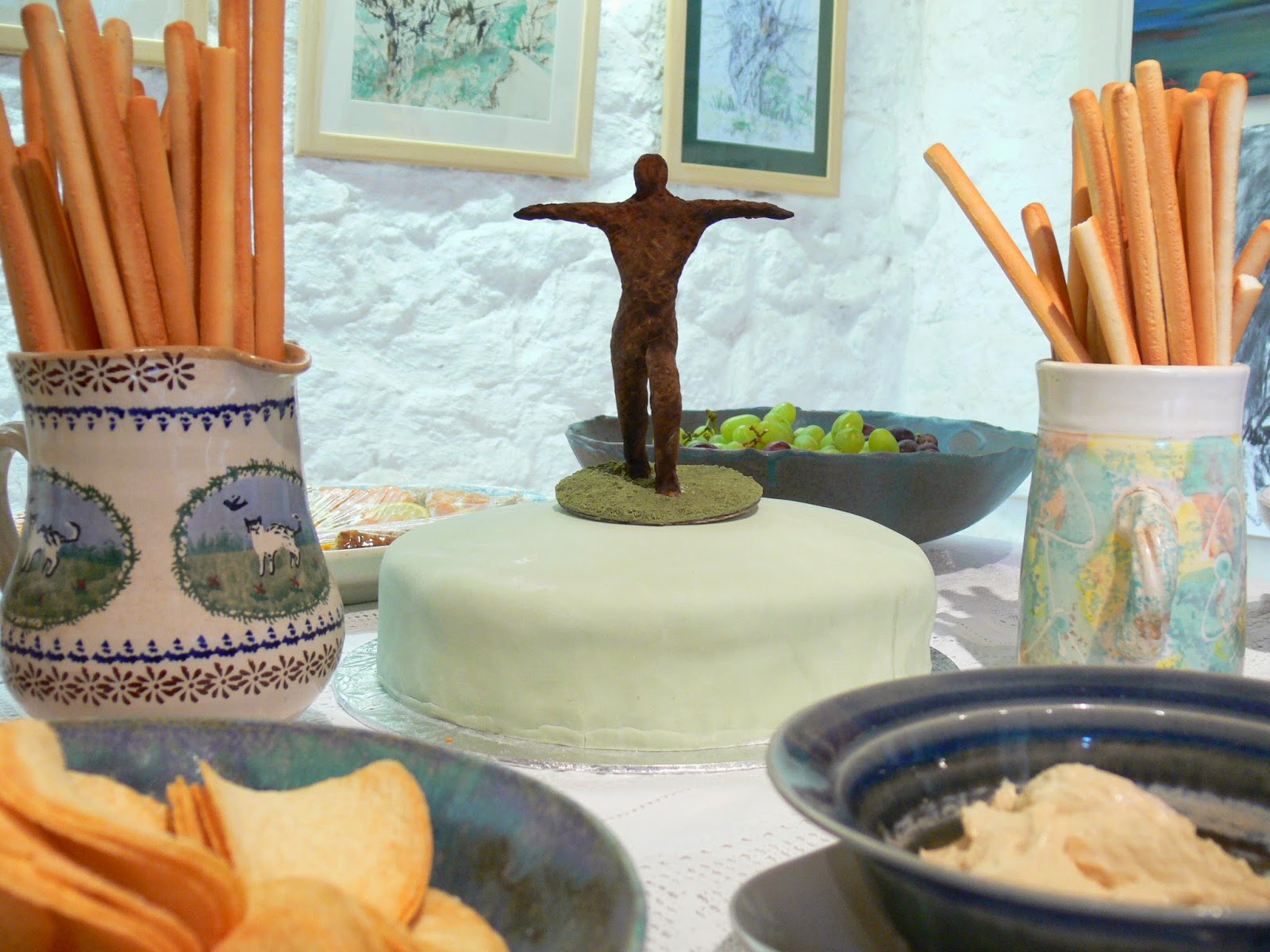 |
| The cake |
Sara lives on a farm, and she and her family had recently converted an old stone barn into a lovely space for her to use for her painting and pottery classes. It would be perfect. So, I talked to our local
Ottakars (now Waterstones), who agreed to come and sell books, I talked to Walker Books, who agreed to contribute generously towards wine, and whose sales rep, Tim Howard, came along to help, and I talked to my sister, who made a beautiful cake and generally advised about food.
As the event drew nearer, the butterflies began to do a samba in my stomach. Would there be enough to eat? Could I cope with being the centre of attention? Wasn’t this all a bit big-headed and show-offy? Would anyone actually come? When should we start to get the studio ready? “Bit busy this week,” said Sara vaguely. “Don’t worry, it’ll be fine.”
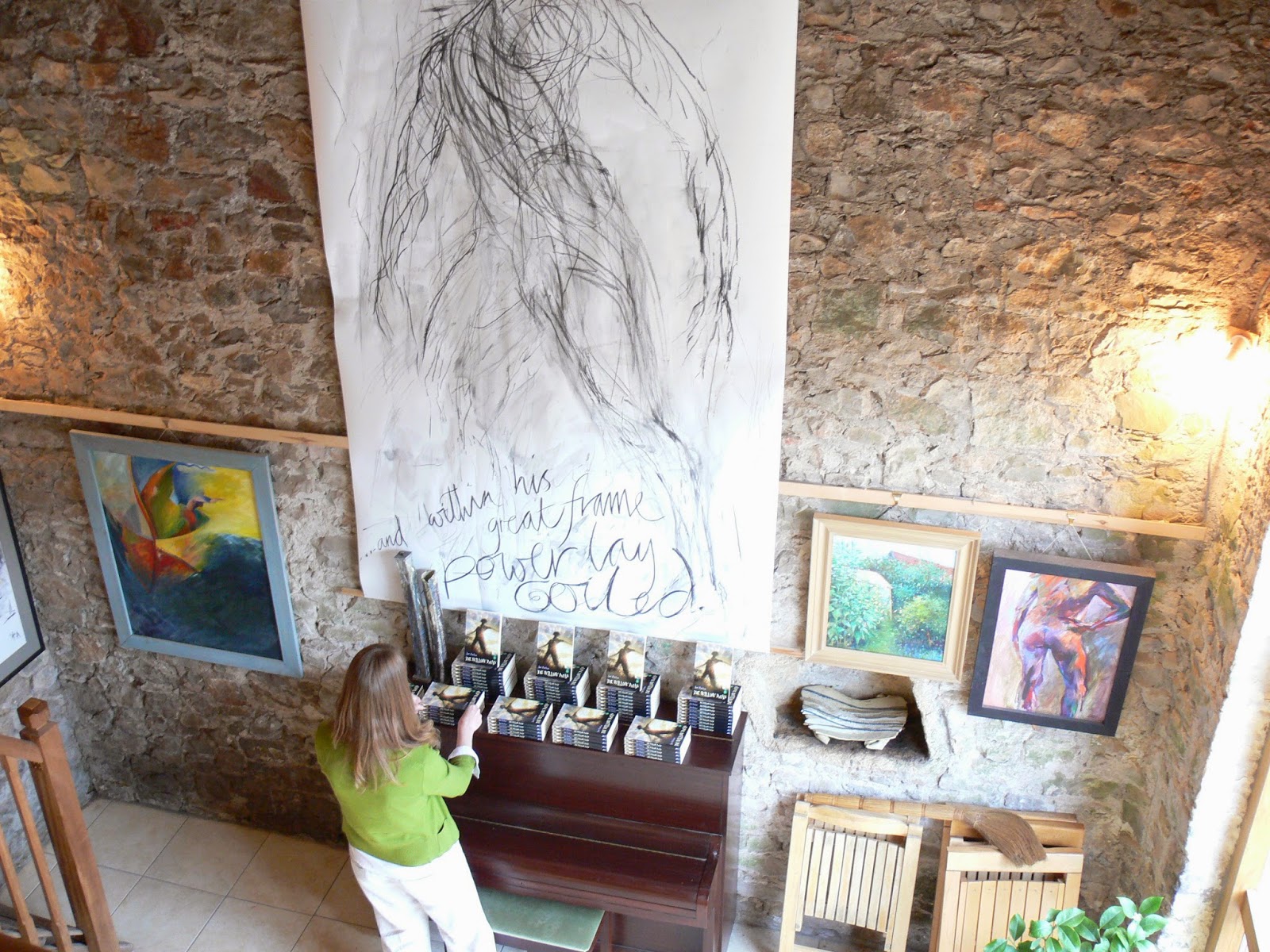 |
| Sara,s drawing - well, most of it. |
On the morning of the launch, we stood looking at the vast space. “Hm,” said Sara. “Think I’ll do a picture. That’d be nice, wouldn’t it?”
It was more than nice. She did a magnificent charcoal sketch depicting the Willow Man (the one who stands beside the M5 near Bridgwater. He used to be magnificently obvious, but now he’s surrounded by supermarket depots and housing estates, so he's less easy to see.) Beside him she wrote, in her beautiful calligraphic script, the line from the cover: In his great form, power lay coiled. By the time evening came, Sara’s panache had transformed the place with fairy lights, textiles, pictures and pots. Lots of people came and it was lovely, and I’m not sure if I ever thanked Sara enough – so here’s a great big belated thank you right now!
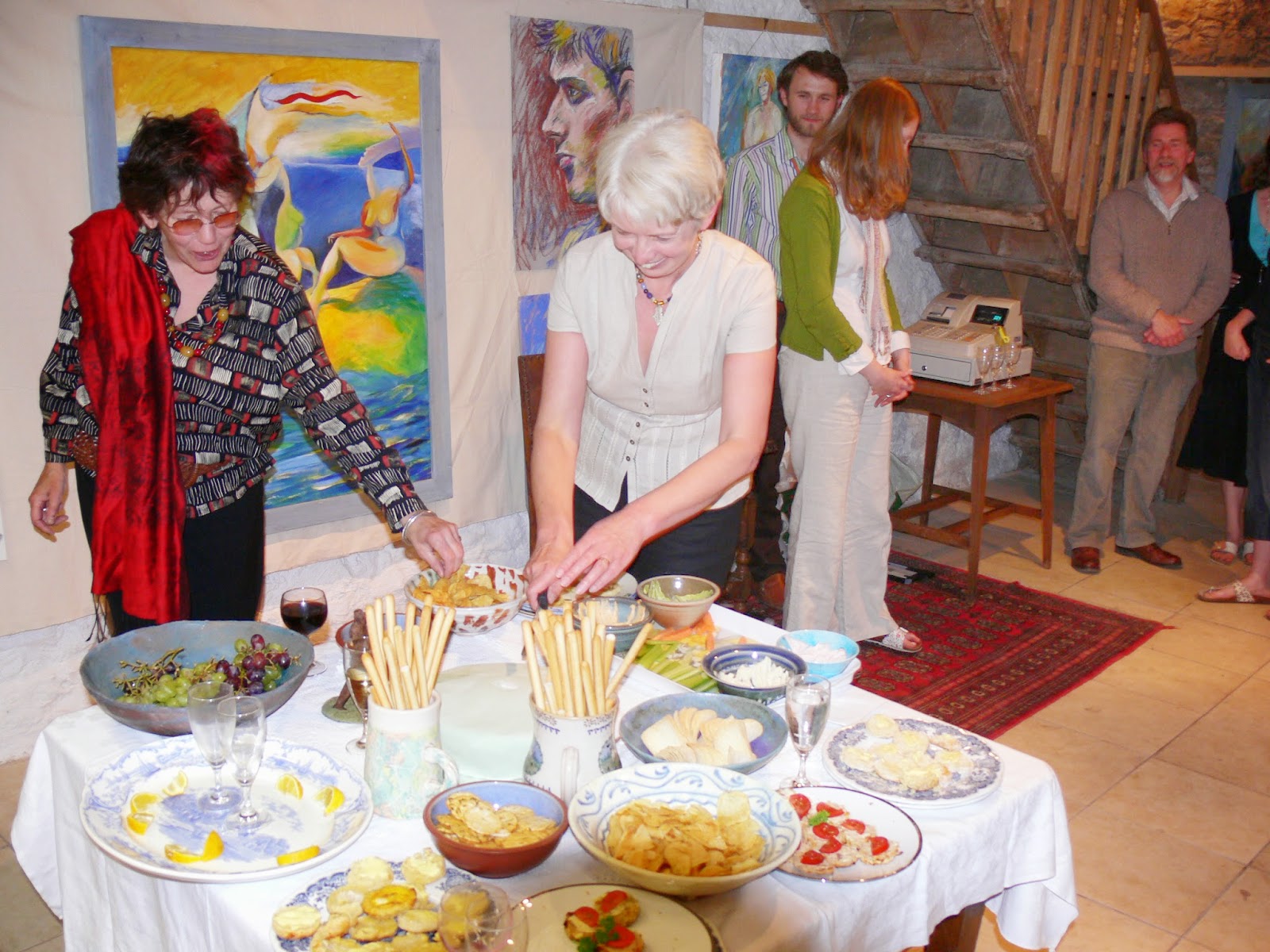 |
| Sara on the left, me in the middle and Tim Howard at the bottom of the stairs. |
That's a while ago now. But in a couple of weeks, I’ve got another launch coming up. It’s not a book launch this time; it’s a blog launch. I’ve contributed to ABBA off and on, to its sister site, ABBA Reviews, and to the History Girls group blog for quite some time, but now I’m going to have a blog of my own. It’s called A Fool On A Hill – because I do a lot of thinking while walking up on the hill. (At least I used to, when we had our much-missed dog Jessie, and I hope before long I’ll be up there again with another, as yet unchosen dog.)
It’s going to be mostly reviews. I hope eventually people will send me new children’s books to review, but I will also write about some of my other reading. But my first post – on 7th October – will be about the wonderful Linda Newbery’s first book for adults, Quarter Past Two On A Wednesday Afternoon.
I hope very much to see you there – but in the meantime, I have a review today on ABBA Reviews. It’s about a very good and very funny book by John Dougherty, and I hope you’ll take a look at that too!
Reading Tanya Landman's post yesterday about the shortcomings and strong points of heroines on the silver screen got me thinking about the films I saw as a child.
The very first film I ever saw in the cinema was called Cimarron. It was at the King's Cinema, down near the bottom of town in Ilkeston, Derbyshire. I can remember the occasion, and heading towards the cinema, and having an ice cream in the interval, but all I remember about the film was that it was a western.
Having just googled it, I'm not surprised the actual film didn't make much of an impact; the story is so complicated I completely lost the will to follow it after the first few lines, and it certainly wasn't directed at children. I'm not sure if many were in those days. (Isn't it odd how that happens? When I was little, I used to love hearing about the 'olden days'. And now the days of my childhood are the olden days. Sigh. Oh well, never mind.)
Anyway, back to Cimarron. It must have been my mother's choice. She loved westerns, and watched them all on the television: Tenderfoot, Wells Fargo, The Lone Ranger. The second film we went to see was also a sort of western, but a musical one; it was Oklahoma. I liked that: I liked it a lot. We bought the long-playing record and I learnt the songs pretty much off by heart. I still do remember a lot of the words; if you don't watch out, next time we meet I may very well start singing them. I was particularly fond of 'Poor Jud is dead,/A candle lights his head;/He's looking oh so peaceful and se-rene (Chorus, sung soulfully: And se-rene!')' Though there was also a lot to be said for 'I'm just a gal who cain't say no'.
After that, the next cinema experience I recall was going to the Saturday matinee to see the children's programme. This was at a different cinema, the Ritz, in the town centre. I think I used to meet my friend Susan Lawrence there. There were two or three different elements to the programme, but the only one I remember was the serial, which was also a western. Westerns were very big in those days. We might have been stuck in a pit town surrounded by slag heaps, but we dreamed of the open spaces.

The next individual film that made an impact must have been a few years later. It was The Sound of Music. I think Mum was there, and maybe another mum, and several friends, and we went to a cinema - probably the Odeon - in Nottingham which had - gasp - several screens in the same building. I loved that film. To be honest, I still do. Though I would have been only fourteen going on fifteen, I wasn't Liesl or any of the children: I was Maria, weird haircut, very loud voice and all. (Actually, all of a sudden, I begin to see exactly why I identified with Maria...) I was the heroine who saved the day at the end, and valiantly led my merry crew over the Alps to escape the Nazis.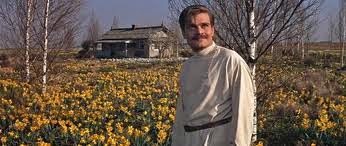
Then the epic triumvirate - Dr Zhivago, Lawrence of Arabia and Far From the Madding Crowd. By this time, I wasn't a child any more, but I was still at school so I think it counts. Oh, the swoop and the sweep of those films! Peter O'Toole in his white robes with those glittering blue eyes, staring out into a vast desert; Omar Sharif and Julie Christie in a sleigh bowling through snowy wastes; Terence Stamp mesmerising Julie Christie among the ancient hills of Dorset - fantastic stuff!
Ironically, the only cinema I don't remember going to in Ilkeston is the only one that remains, and it's quite a significant building. A hundred years old, it's listed, it's the second oldest working cinema in the country, and it's probably the only bit of Ilkeston which quite often features as a television backdrop. The others are all long gone.
Which are the films that stick in your mind from those you saw as a child?
I've always found that there are certain characters in books of whom I get so fond that I don't want to say goodbye to them when the book ends. The hobbits were like that; when I finished The Lord of the Rings, I walked around in mourning for some days because I was no longer in a world where they were. Perhaps oddly, Horatio, in Hamlet, is another. There's something I really like about Horatio. He's on the edge of things, watching, but loyal and caring and clever. I picture him with a long scarf wound round his neck, glasses, a shock of dark hair, a wry smile. A bit like a French assistant we had when I was in the sixth form, as it happens!
And it's the same with the books I write. A few years ago, I wrote a book about Alfred the Great. It was called Warrior King. It's out of print now, but like Arnie, it'll be back. Soonish, I hope! There was a character in there called Cerys, a magic lady, a wise woman, with silver eyes. I really liked her.
 She emerged from my imagination, but the other character from that book who stayed in my mind was real. She was Alfred's daughter, Aethelflaed (though in the book I called her Fleda - it made it less confusing, because there were so many other Aethel-whatnots hanging around). I discovered her when I was looking for a child who could be my point-of-view character when telling the story of Alfred - it was such a gift when I discovered that his oldest child was a daughter who would be just the right age at the time of the events in my story.
She emerged from my imagination, but the other character from that book who stayed in my mind was real. She was Alfred's daughter, Aethelflaed (though in the book I called her Fleda - it made it less confusing, because there were so many other Aethel-whatnots hanging around). I discovered her when I was looking for a child who could be my point-of-view character when telling the story of Alfred - it was such a gift when I discovered that his oldest child was a daughter who would be just the right age at the time of the events in my story.
But Fleda became much more than that. I grew very fond of her. She was warm, impulsive, brave, and she could be defiant when she was defending something she believed in. I knew she must have been like that, because I knew that later, after the scope of my book, she married the Lord of the Mercians - and after his death, she became the Lady of the Mercians, Myrcna Hlaefdige, their de facto queen. She led them into battle and rebuilt their towns, and after her death, she was named in the Annals of Ulster as 'famosissima regina Saxonum', that most famous queen of the Saxons.
So when I got the chance to write a story for an anthology called Daughters of Time, a collection of stories about remarkable women from British history, written by contributors to the History Girls blog, it took no thinking at all to decide whom I would choose. I wrote about Aethelflaed at a time of transition for her, when she went from being princess of Wessex to wife of the Lord of the Mercians. It was an absolute joy to spend more time with her.
 The only trouble is that the more I read about her, the more interesting she became. She had one daughter, Aelfwyn. She fostered her brother's oldest (but not quite legitimate) son, Aethelstan (who later became a great king of England): her brother was Edward, who succeeded Alfred. She fought alongside her brother; they must surely have been close. Yet after Aethelflaed's death, when Aelfwyn should have succeeded her, Edward rode in and carried Aelfwyn away into Wessex... and nothing more was heard of her. Edward became King then of Mercia as well as Wessex. Maybe she was put into a nunnery - or maybe not.
The only trouble is that the more I read about her, the more interesting she became. She had one daughter, Aelfwyn. She fostered her brother's oldest (but not quite legitimate) son, Aethelstan (who later became a great king of England): her brother was Edward, who succeeded Alfred. She fought alongside her brother; they must surely have been close. Yet after Aethelflaed's death, when Aelfwyn should have succeeded her, Edward rode in and carried Aelfwyn away into Wessex... and nothing more was heard of her. Edward became King then of Mercia as well as Wessex. Maybe she was put into a nunnery - or maybe not.
How much conflict and conniving, triumph and sadness, lie behind those few bare facts! I'd love to spend more time with Aethelflaed - and with Aethelstan and Aelfwyn. I'd love to explore their stories and try to understand their lives. One day, perhaps!
Daughters of Time is published this weekend. My story of the Lady of the Mercians is in there, but so are twelve other fascinating stories, many by writers who have blogged on An Awfully Big blog Adventure: Penny Dolan, for example, has written about Mary Wollstonecraft, Joan Lennon about Mary Anning, Catherine Johnson about Mary Seacole, Dianne Hofmeyr about Elizabeth Stuart. If you don't know much about any of these - as I didn't - you know what you need to do!
.jpg?picon=1806)
By:
Sue Purkiss,
on 3/30/2013
Blog:
An Awfully Big Blog Adventure
(
Login to Add to MyJacketFlap)
JacketFlap tags:
Mary Hoffman,
Vivian French,
Nick Green,
Szymborska,
Julia Donaldson,
Sue Purkiss,
Denis Johnson,
Rod Campbell,
Jack Tickle,
Add a tag
This week I've been staying with my son and his family in Brussels, One of the very many nice things about doing this is that I get the opportunity to read lots of new books. It starts on the journey over there. I travel from Bristol to London by train or bus, and then usually on the Eurostar, so there's plenty of time to read, and my Kindle allows me to take a good supply of books along with me. This time I finished the second book of The Flaxfield Quartet by Toby Forward, which is a fantasy about wizards (but not at all like Harry Potter). It's very good, and I'll be reviewing it soon over on Abba Reviews. Then I began The Storm Bottle, an unusual adventure story set in Bermuda, by fellow SAS author Nick Green, who knows so much about dolphins that I suspect he may have been one in another life. I'll finish that later today on the journey back.
 Then I have a treat in store - Mary Hoffman's David, which is about the model for Michelangelo's famous statue. Mary Hoffman is another SAS person, and I first heard about this book when she talked about it at an SAS conference, just before it was published a few years ago. I've been meaning to read it ever since, and now the right moment has arrived: yesterday, I went to an exhibition in Brussels about Leonardo da Vinci, with my son and eldest grandson, Oskar. There were models of many of Leonardo's inventions - here's Oskar trying one out - and a film about his life and about the re-creation of some of his designs: notably an early parachute which an English adventurer with a gleam in his eye decided to try out - and survived to tell the tale! Anyway, there were hints of a not-very-friendly rivalry between Leonardo and the much younger Michelangelo, so I'm hoping Mary might have something to say about that. Even if she doesn't, I just want a pass into the world of fifteenth century Italy, and I know her book will give me that.
Then I have a treat in store - Mary Hoffman's David, which is about the model for Michelangelo's famous statue. Mary Hoffman is another SAS person, and I first heard about this book when she talked about it at an SAS conference, just before it was published a few years ago. I've been meaning to read it ever since, and now the right moment has arrived: yesterday, I went to an exhibition in Brussels about Leonardo da Vinci, with my son and eldest grandson, Oskar. There were models of many of Leonardo's inventions - here's Oskar trying one out - and a film about his life and about the re-creation of some of his designs: notably an early parachute which an English adventurer with a gleam in his eye decided to try out - and survived to tell the tale! Anyway, there were hints of a not-very-friendly rivalry between Leonardo and the much younger Michelangelo, so I'm hoping Mary might have something to say about that. Even if she doesn't, I just want a pass into the world of fifteenth century Italy, and I know her book will give me that.
 Richard and Joanna are great readers, so there are usually lots unfamiliar books for me to read here - though nowadays Richard mostly uses his Kindle: apart from the convenience, it's much cheaper to buy English books in Belgium that way. Still, I was able to read Ian Rankin's latest, Standing In Another Man's Grave, in which crotchety detective Rebus makes a welcome return from retirement, and also a book called Train Dreams, by an American writer called Denis Johnson. I'd never come across this author before. The book, which was shortlisted for the Pulitzer Prize, is very short (only 116 small pages), but it packs quite a punch without wasting a word. It's about an ordinary man, Robert Grainier, living in rural America in the first half of the 20th century, and it reveals how the extraordinary can be found inside the apparently ordinary: Robert is an unassuming, kindly man who endures some terrible things, and just keeps on. Despite being so short, it somehow manages to have an epic sweep.
Richard and Joanna are great readers, so there are usually lots unfamiliar books for me to read here - though nowadays Richard mostly uses his Kindle: apart from the convenience, it's much cheaper to buy English books in Belgium that way. Still, I was able to read Ian Rankin's latest, Standing In Another Man's Grave, in which crotchety detective Rebus makes a welcome return from retirement, and also a book called Train Dreams, by an American writer called Denis Johnson. I'd never come across this author before. The book, which was shortlisted for the Pulitzer Prize, is very short (only 116 small pages), but it packs quite a punch without wasting a word. It's about an ordinary man, Robert Grainier, living in rural America in the first half of the 20th century, and it reveals how the extraordinary can be found inside the apparently ordinary: Robert is an unassuming, kindly man who endures some terrible things, and just keeps on. Despite being so short, it somehow manages to have an epic sweep.
Joanna is Polish, and she lent me a book of poetry by a poet called Wislawa Szymborska, called Tutaj/Here. The poet was 85 when this book was published, but her quiet, ironic, amused voice is ageless. I particularly liked a poem called Thoughts That Visit Me on a Busy Street, which ponders the possibility that Nature recycles faces:
These passersby might be Archimedes in jeans
Catherine the Great draped in resale,
some pharoah with briefcase and glasses.
 Then there are the books I read with my grandchildren. Oskar has been 'doing' Julia Donaldson at school, so we read several of hers, and also a book I'd taken over for him - Vivian French's Hedgehogs Don't Eat Hamburgers, which is a rhythmic, funny delight. Casper is only sixteen months old, but he already has his favourites: Rod Campbell's flap book, Dear Zoo, an Usborne nursery rhyme book which plays the tunes, and two French board books which he knows will play sounds if he presses a finger in the right spot. I took him a book by Jack Tickle called The Very Silly Sheep, which has brilliantly engineered pop-up animals. Casper loves it, as you can see, but I'm not sure how long it will survive intact!
Then there are the books I read with my grandchildren. Oskar has been 'doing' Julia Donaldson at school, so we read several of hers, and also a book I'd taken over for him - Vivian French's Hedgehogs Don't Eat Hamburgers, which is a rhythmic, funny delight. Casper is only sixteen months old, but he already has his favourites: Rod Campbell's flap book, Dear Zoo, an Usborne nursery rhyme book which plays the tunes, and two French board books which he knows will play sounds if he presses a finger in the right spot. I took him a book by Jack Tickle called The Very Silly Sheep, which has brilliantly engineered pop-up animals. Casper loves it, as you can see, but I'm not sure how long it will survive intact!
This is my last post for the time being; I decided it was time to stand aside for a while. You'll see some exciting new blogsters joining us over the next month, namely Damian Harvey, Lari Don, Saviour Pirotta and Anna Wilson. I'll continue to review over on ABBA Reviews, and to post on The History Girls. Thank you for reading, and I hope to see you over there!
www.suepurkiss.com
Someone in my book group recently recommended to me a DVD called Searching for Sugar Man. I don't normally buy DVDs, but it just happened that the shop in Bristol where she found it is on my beat at the moment, and so I went in and asked for it.
It's a documentary, and it tells a real Cinderella of a story. In the early 1970s, two eminent record producers discovered a singer playing his guitar in a bar in the back streets of Detroit. No-one knew much about him; he even played with his back to the audience and a hat shading his face, as if he shunned publicity and played only for the sake of his music. His tunes were melodic, the kind that stuck in your head; his words were intriguing and seemed to come from the heart. He reminded them of Bob Dylan, but with a sweeter voice. He was called Sixto Rodriguez.
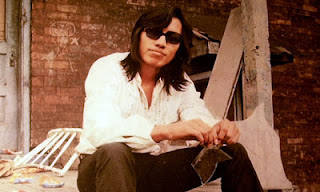
They made an album with him, using all their considerable expertise and resources, and, delighted with the results, they sat back to wait for America to fall at his feet. But it didn't happen. There was nothing but a resounding silence. Inexplicably, it bombed, as did the next one. Talking about this in the film, one of the producers was almost in tears, even after so many years: he simply could not understand why it failed. The record company let him go, just before Christmas: prophetically, one of his songs had been the story of a man who lost his job two weeks before Christmas.
That would have been the end of the story. But unbeknown to anyone in America, somehow or other a bootleg recording found its way to South Africa, where his protest songs found an echo in the hearts and minds of the people there who were rising up against apartheid. Over the next twenty years, Rodriguez became huge in South Africa: anyone who had a record collection would have his music in pride of place. It was the background to their lives.
No-one knew anything about him. There were rumours that he had committed an ultimate act of protest or despair, and killed himself on stage. Eventually, two South African fans decided to investigate. As far as they were able, they followed the money: to whom had the profits from all his record sales gone? The trail grew blurred, but in the end, they found a different lead - and a simple phone call established that Rodriguez was not tragically dead; he had simply returned to his life as a builder, and continued to live in the same house he'd always lived in. No-one he worked with had a clue about his early brush with fame, and he had absolutely no idea about his extraordinary popularity on another continent.
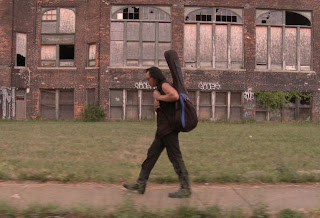
Well, the two investigators went to see him. They persuaded him to visit South Africa, where he played concerts to thousands and thousands of ecstatic fans. He strolled out there into the spotlight as if he'd been doing it all his life. His voice was just as good as ever. And the profits from his new-found fame? He wasn't interested. Apparently, he has given much of the money from recent concerts and records away to family and friends. he still lives in the same house, and he doesn't give two hoots for all the lost profits from the million of his records sold in South Africa during the lost years.
The film is absolutely gripping. It's just won a Bafta, and deservedly so.
Of course, I could make a parallel between the undiscovered genius of this likable unassuming man, and the fate of who knows how many other artists - children's writers among them! - who have also languished in obscurity, in or out of a garret. But in truth, that isn't the point. I just want you to look out for this film, because it's the most feel-good work of art I've come across in a good while. And the music's good too!
A couple of months ago, I went into my local bookshop looking for books for my six year old grandson. One of the assistants said, “How about the Moomins? Has he read those?”
Well, no, I thought. And neither have I. There’s too much text for my grandson, but not for me.
I picked up Comet in Moominland and took it to the counter. “Ah,” said another of the assistants, nodding wisely. “The Moomins.” “Are you a fan?” I asked. “Oh yes. Any book would be better for having a Moomin in it.” (Now there’s interesting. War and Peace, with Moomins? Oliver Twist and the Moomins? I'm not sure it would work, but it shows how much the Moomin books mean to him.)
I read my first Tove Jansson book about four years ago. It was called The Summer Book, and it was on the adult shelves. It was the cover that attracted me first. It’s a paperback, but it has flaps, so you can easily mark where you stop reading. I like that. And I’ve no idea why, but the cover is nice to the touch – soft and smooth, but substantial. It shows a deep blue sky (Aquamarine? Ultramarine?) with just a couple of light cloud trails, and in the bottom quarter of the page is a small wooded island, edged with a pale stony beach, set in a dark blue sea.
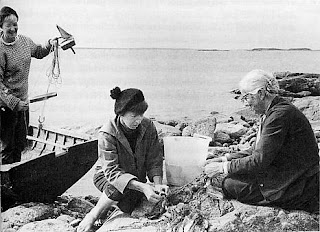 |
| On the real island |
It’s about an elderly artist and her six year old grand-daughter and a summer they spend on the island. Nothing huge happens. When the southwest wind was blowing, the days seem to follow one another without any kind of change or occurrence… It was just the same long summer, always, and everything lived and grew at its own pace. It’s a small world, with only a few characters, and Tove Jansson simply takes you right into it, so that you come to know the place and the people very well, in all their apparent simplicity. You enter deeply into the way they experience life. And that isn’t an easy thing to do, either as a writer or as a human being.
I’ve read her other adult books too, though I think The Summer Book is my favourite. But the Moomins are what she’s famous for, and until now they have completely passed me by. I had vaguely thought I might have seen a television series, but then realised I was confusing it with something else – was it called The Clangers? About triangular shaped characters who lived on the moon and made funny squeaky noises?
 |
| Tove and a Moomin |
Anyway, the Moomins are not at all like that. They are small creatures which look a little like smoothed-out hippos, or possibly – given that they’re Scandinavian – tiny trolls. They go on epic journeys and have great adventures away from the safety of home, but all in a slightly Winnie-the Pooh sort of way; I don’t mean it’s like Winnie-the-Pooh, but the characters have that quite grave way of thinking and speaking. And after the adventures, they come back home again. This is the last paragraph of The Moomins and the Great Flood:
And then she (his mother) took Moomintroll by the hand and went into the sky-blue room. And there in the valley they spent the whole of their lives, apart from a few times when they left it and travelled for a change.
It’s the same voice as it is in the adult books: cool, clear, utterly unpretentious and essentially rather serious. I love it, and though I’ve come a bit late to the Moomins, I intend to make up for it and read my way through the rest of them. Are there any other fans out there? And if so, can you explain what it is that you like about them?
www.suepurkiss.com
Landscape is very important to me, both generally, and in my writing. Different landscapes reflect and inspire different moods, different thoughts - in fact, the same landscape can occasion different moods. I was in France recently, in La Rochelle, a seaport on the Atlantic coast. It has a small artificial beach. One day, the sea was a dull greenish grey, the sky a mass of bright blue-grey cloud. The sand was pale, almost white, and there were were one or two white sails out on the water. There were two vivid spots of colour: a coat, and a buoy, both bright scarlet. There was something striking about the limited range of colours: something ominous and strange.

The next day, I saw the same spot in sunshine. The sky was mostly blue, with innocent puffball clouds. The sea was a much darker blue, and it looked calm and inviting; there was no hint of threat. You can imagine the different types of story - or different points in the same story - in which those two variations of the same scene could feature - could, in fact, become central to the narrative. I don't have a picture of the beach, but here's one of the towers of La Rochelle in that very special evening light you sometimes get. (They are beautiful, the towers of La Rochelle beautiful, but one of them was a prison in Napoleonic times and earlier - the walls are scratched with graffiti, carved painstakingly with images of the ships from which the prisoners had been captured.)
An exhibition at the British Library explores the way in which the British landscape has inspired writers for the last thousand years. It shows how authors not only record what they see, but their ' novels, poetry and plays can shape our perceptions and transform our places through imagination.'
Of course, if there's one thing the British Library has plenty of, it's books. But how do you go about creating an exhibition out of them? Well, first you decide on different types of landscape: Rural Dreams, Dark Satanic Mills, Wild Places, Beyond the City, Cockney Visions, and Waterlands. Then, you sift through the extraordinary range of manuscripts and printed books you have at your disposal - and you realise that for each category, you can display a fantastically eclectic mix of writers. So, for instance, with Beyond the City, which explores the suburbs (are they an idyll? A threat? A refuge?), next to a gorgeously illuminated centuries-old volume of the Canterbury Tales (click here to see this), you may find an excerpt from one of J G Ballard's books about the 'edge-lands', or something from Betjeman. Rural Dreams has examples from Hardy, a manuscript of Edward Thomas's poem Adlestrop, and the manuscript of Alan Garner's The Owl Service, along with a recording of Stella Gibbons talking about how she came to write one of the funniest books I've ever read, Cold Comfort Farm. Dark Satanic Mills includes a fascinating display about Ted Hughes' book, Remains of Elmet, which was inspired not only by the industrial remains in the Calder Valley, but also by Fay Godwin's wonderful, atmospheric photos of this landscape: recordings and letters offer a fascinating insight into how each of them fed off the other's vision.

There are videos, too, with writers such as Simon Armitage and Robert MacFarlane discussing the part landscape plays in inspiring their writing, and images and soundscapes - the ones which illustrate Waterworld are particularly atmospheric and imaginative.
The exhibition is called Writing Britain: Wastelands to Wonderlands. If you can make it to the exhibition, be sure to go to the cafe to restore yourself afterwards - it has its very own collection of treasures, including a pear and chocolate tart which I recall with deep affection and not a little longing!
So what have I been up to on the last few Thursday mornings?
Well, let's see.
I've been a little girl with a crush on a handsome German prisoner of war, who made her a tiny bracelet woven from strands of coloured wire - which she was still to treasure nearly seventy years later, even though her father told her she must have nothing to do with the enemy.
I've flown over the ocean on a giant seagull, and come home safely.
I've gone reluctantly to Death Valley in California, put off by the warnings to take at least five litres of water per person in case the car breaks down - only to be blown away by a landscape like nothing I've ever seen before, with a silver lake that turned out to be made of salt and rocks striated with brilliant colours.
I've said goodbye to my fiancee in the bustle of a London station during the war, not knowing that he would be captured and I wouldn't see him again for four years. And I've walked across London Bridge with a stranger, with fires raging behind me and the sky raining soot, unaware that the home I was hurrying towards had been destroyed by a bomb.
I've travelled through time when my mother looked out a dress that I could wear to a sixties party - a dress of cobalt blue, shot through with electric rainbows: a dress that changed the world as I slipped it over my head.
For the first time in a lifetime of riding, I've felt death touch my shoulder as my horse bolted along a precipitous mountain path.
I've been a small girl - a different one - taking refuge in an Anderson shelter as the bombs rained down over Birmingham. Terrified, I've felt my way along slippery garden paths in total darkness, following my grandmother in her best coat with the fox fur collar and the velour hat with its two ostrich feathers, wondering if my grandfather, who refused to give into the Luftwaffe by getting out of his bed, would survive the night.
I've done all these things and more by proxy, as I've sat and listened to the stories the students in my writing class had to tell. Only one of them has even a vague interest in publication; they write for the love of it and find that they have more to say than they ever imagined, and we are all the richer for this wealth of generously shared experience.
As it happens, though, some of their work is going to reach a wider public. One of the group, Jo, is organising an exhibition at Wells M
Once a week, I teach a writing class in the village where I live. At the moment I have 11 students; the youngest is 20+, and the oldest is 90-. (The oldest, Phyllis, had a new laptop for Christmas, and she's very excited about the word count tool.) As far as I know, there is only one who wants to actually write a novel, the rest are just delighting in the opportunity to do something they've always enjoyed but have never quite got round to before. For the first few weeks this term, I decided to do some poetry. It's not what any of us likes best, but I felt it would be good to go macro - to focus on something concentrated - rather than going large, which was what we did last term with fiction and a little biographical writing.
As always, the students surprised me. Their natural tendency is to use rhyme, so I asked them to write shape poems. It was just playing, freeing them up: I didn't expect them to come up with anything much. But they did: there were several that, after they'd been read out, provoked that moment of stillness, that sort of 'Oh!' of surprise at a freshly minted thought or image. (I'm sorry I don't have any of them to hand to demonstrate - you'll have to take my word for it.) The following week, we did haikus, and the same thing happened. There was a lovely one by a farmer, where she talked about her favourite time of day on the land, 'in the amber light of evening' if memory serves me well.
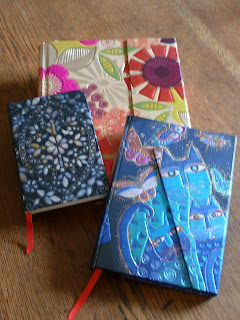
The week after that, I began by revisiting the idea of using notebooks. I showed them mine. There are three I use at the moment. Here they are. The smallest one I keep in my handbag, ready for if I have a sudden thought of earth-shattering genius while I'm on the move. I bought it in Brussels at an art exhibition. The other two were gifts. The larger one I use if I'm away, or if there's an idea I want to play about with in the evening, when I'm away from the hut where I usually work. The blue cat one sits in a drawer in my desk: I use it to give myself a stern talking to when I'm faffing, and need to set some priorities or clear my thoughts about what I'm writing.
But as I was thinking about suggesting to my students the sort of things they might want to note down in their newly acquired books, I had an idea. How would it be if, before they sat down to do their 'homework', they limbered up by writing a haiku? I am absolutely not a poet, but it seems to me that what haiku does is enable you to focus on a momentary impression, feeling, sight, thought, and then to reflect on it. It is very short: the commonly used form in the English version has three lines, with five syllables in the first and last lines and seven in the middle one. So you have to be very economical in your use of words; you have to make choices. I like this idea; I think it must be good for the soul, and probably for the writing.
I decided to have a go myself. There was no sudden blossoming of poetic genius, but it drew my thoughts together - it drew some words together which conveyed something of what I was thinking about that morning. Here is the best of my efforts so far.
Rose on winter branch
Nearby, first blossom of spring

And the snow, waiting.
I shall be interested to see if my students had a go too - I'm sure if they hav
I've just re-read Terry Pratchett's book, Lords and Ladies - such fun! Part of the renowned Discworld series, it stars the three witches, Granny Weatherwax, Nanny Ogg and Magrat Garlick. It also features the wizards - in particular, Archchancellor Ridcully. At one point, a bandit chieftain foolishly holds up the coach which is carrying Ridcully, the Bursar, the Librarian and Ponder Stibbins. The chieftain sees the wizard's staff poking out of the window.
'Now then,' he said pleasantly. 'I know the rules. Wizards aren't allowed to use magic against civilians except in genuine lifethreatening situa-' There was a burst of octarine light. 'Actually, it's not a rule,' said Ridcully. 'It's more a guideline.'How familiar was
that? It's almost exactly what Captain Barbarossa declared in Pirates of the Caribbean, when Keira Knightley called on him to stick to the terms of the Pirates' Charter. I think that bit was used in a trailer; it was certainly quoted in reviews as one of the funniest lines in the film. But here it was:
Lords and Ladies was published in 1992. Terry Pratchett wrote it first.
I'd be willing to bet that whoever wrote the script didn't realise the line was second-hand. For some reason, it resonated, as it did with me: it lodged in the scriptwriter's mind, and out it popped when it was needed. He probably had no idea he'd first seen the line in the book.
It made me think about why it is that some combinations of words are persistent, echoing in the memory long after what surrounded them has been forgotten. I haven't come up with any answers so far, but I have come up with some examples. Here are my first ten. They're in no particular order, and they're not necessarily accurate - they're as I remember them. Incidentally, I don't have a good memory for quotes - or for jokes - so if I remember something, it must have very considerable staying power!
'Tread softly, for you tread on my dreams...'
(W B Yeats - the whole poem is gorgeous. It's lovely as a song, too.)'Christ if my love were in my arms'
And I in my bed again!
Anon (but very old!)'Today was bad, but tomorrow will be beyond all imagining...'
Susan Cooper: The Dark is Rising'Je crains notre victoire, autant que notre perte.'
This is from a French A-level text, Horace, by Corneille. It means 'I fear our victory as much as our defeat'. I think the speaker had a lover on one side of the battle and a brother on the other. Beyond that, I remember nothing about the play, and I've no idea why this phrase has stuck. Mind you, now I come to think about it, there are all sorts of situations to which it could apply.'The drunkenness of things being various.'
(From Snow, by Louis MacNeice)
'We cannot cage the minute
Within its nets of gold
When all is told
We cannot beg for pardon.'
(The Sunlight on the Garden, also MacNeice)
'I could be bounded in a nutshell, and count myself a king of infinite space, were it not that I have bad dreams...'
(Shakespeare's Hamlet)
'Of all the gin joints in all the towns in all the world, she walks into mine...'
(Casablanca - like Shakespeare, the source of so many resonant quotes.)
'I would have poured my spirit without stint
But not like this. Not on the cess of war.'
(Wilfred Owen: Strange Meeting)
Five years ago, I wrote a book called The Willow Man. It was about three children who were 'stuck' in different ways, and it told the story of how they became unstuck. The catalyst in this process was the Willow Man: a figure forty feet tall, woven out of willow.
I knew children who were stuck in the ways I describe in the book. And I knew the Willow Man. Ever since the year 2000, he had stood beside the M5, just outside Bridgwater. Thousands of people drove past every day, and like me, they gazed at him and marvelled. This is how I described him at the beginning of the book:
His powerful torso was twisted at a slight angle to his massive thighs, so that his small head gazed with a mixture of defiance and contempt across the concrete ribbon of the motorway. He seemed to be perfectly balanced on one leg: the other was bent, as if at any moment he might choose to complete the step and take his freedom...
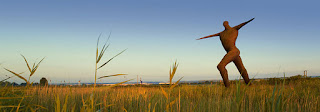
He was created by Serena de la Hey as part of the millenium celebrations. She knew he wouldn't last forever: how could he, when he was made out of living willow? I don't think she guessed what an iconic figure he would become: the north of England had the great metal figure, the Angel of the North - but now we had our own angel, the Angel of the South. He stood outlined against the sky, emblematic of the power of life and nature.
About a year later, I was driving down the M5 and I saw that something terrible had happened. All that was left of the Willow Man was a steel skeleton. Vandals had set fire to him, and all that careful craft, all that artistry which had been woven in with the willow - all of this was turned to ashes. There was a public outcry, a positive howl of sadness and outrage: the Willow Man must be rebuilt. And he was.
He became an emblem of Somerset; his picture has appeared on leaflets, on posters, on the sides of trains. He was a part of the landscape - an expression of the landscape. But now the Willow Man is under threat from another direction. Well - from all directions. In fact he's not just under threat: it seems as if the battle is already lost. Developers have succeeded where vandals failed. On one side of him is a massive complex of warehouses, belonging to the supermarket, Morrisons: on the other, a housing estate. Instead of a proud figure silhouetted against the sky, a focus for wonder and imagination, he's hemmed in and imprisoned - you can scarcely see him. Look at the pictures: look at him as he was, and as he is.
It seems like the death of a dream.
Houses matter: new jobs matter. But something that makes thousands and thousands of people pause, and reflect, and experience the power of the imagination, every single day - that matters too. Would it be beyond possiblity to set the Willow Man free and rebuild him somewhere else? He cost in the region of £15,000 the first time round. Surely, even in these times perhaps
especially in these times - that's not such a great sum for something that delivers so much?
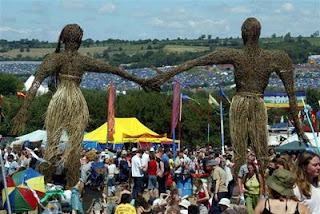
Yes, it's that week in Somerset. The sky is full of helicopters, the roads are full of buses, trucks and cars, the supermarkets are full of people wearing multi-coloured wellies, the hotels are full of BBC staff. It's the Glastonbury Festival.
But more significantly for us, this is the week when authors and school librarians converged on Bruton (which is somewhere past Shepton Mallet, vaguely in the direction of Yeovil – I’m still not entirely sure where) for a networking event, organised by the fabulous Julie Hoskins, librarian at Bruton School for Girls. For some of us, converging was less easy than for others. A group from one school were swallowed up by the Glastonbury traffic and never made it at all.
And then there was me. According to Google maps, I only live 47 minutes away from Bruton. I spent six years in a job which entailed driving all over Somerset. How hard could it be to find the place? Well, very hard, actually. I think it’s something to do with the ley lines. Launch yourself onto the leafy lanes of Somerset, and you have no idea where you’ll end up. I had maps, I had directions, but none of this helped. WHY have I never got round to buying a satnav…?
So I drove round in a succession of circles.(Oh, here’s Wells again. Lovely!) Eventually, just as panic was beginning to flutter its tiny wings, I found myself on a lane which was getting steadily narrower, but which ancient signposts assured me was heading for Bruton. The car and I breathed in: we made it! Unfortunately, we hadn’t arrived by any of the routes described in the directions. Never mind, I thought, it’s only a small place.
A small place which is heaving with schools. I spotted a likely looking cluster of buildings, screeched to a halt and hailed a passing pupil. Oh no, he said, this is Kings School. He drew me a map. I can only think he was trying to sabotage all efforts to reach the girls’ school, because he sent me in completely the wrong direction. More circles. Eventually I sussed his cunning plan and decided the only thing to do was to find a main route into Bruton and start
On Tuesday this week, I went to a Society of Authors summer meeting. It was the first time I'd ever been to 84 Drayton Gardens, the socety's headquarters. The meetings often sound interesting, but it's a long schlep from the wilds of Cheddar Gorge - which, incidentally, will be coming to a screen near you next summer for all of 70 seconds in a blockbuster film called Jack the Giant Killer, starring Ewen McGregor, Bill Nighy, Ian McShane and Nicholas Hoult. They were filming here last week - oh, how excited we've all been! Anyway, that's completely irrelevant - back to Drayton Gardens.
The discussion was entitled Fiction for 7-9s: The Poor Relation? It was elegantly chaired by our own John Dougherty in a lovely flowered shirt, and the panel included Kathy Webb from OUP, Annie Eaton from Random House and Charlie Sheppard from Andersen Press.
First, John asked each of the panel members to give an overview of the market for this age group.
Kathy Webb
- One difficulty is the diversity of this age bracket, which makes matching the reader to the right book quite tricky.
- At this age, there are lots of other activities which take up children's time. On the plus side, they are open minded, they have great imaginations, and they recommend books to each other. Peer pressure is not a problem - it's okay to be seen reading!
- There are a lot of series. Kathy discussed this at some length, explaining that boys like the 'collectability' of series such as Astrosaurs, Beast Quest, Horrid Henry etc. She said that girls also like series, but they are much more author led. However - they like books by the same author to have a similar look and feel. Kathy stressed that they don't cut corners with series; each book gets the same amount of attention as a standalone. She would very much like to publish more standalones, but it's difficult to get kids to read them.
Charlie Sheppard
- Charlie said that this, at the moment, is the Cinderella age group, and is overshadowed by books for older children. Looking at the reasons for this, she said that they need more illustration and more design and are therefore more expensive to produce - and yet the price is the same as it has been for the last fifteen years: so it's difficult to make any money from them.
- Other problems: Smiths and Waterstones prefer series - books for this age group are usually thin. One by itself will get lost, whereas a series creates a presence on the shelf. Series like Yellow Bananas, which were standalones, used to have the same effect because they were strongly branded (ie they looked the same), but similarly packaged series are not being produced now.
- Usually, it's the books for older readers that glean reviews and prizes.
- Then there are the gatekeepers. Or not... librarians have had their budgets slashed, teachers tend not to keep up with recently published books (and so recommend classics, or the books they enjoyed as children or read as students): parents naturally buy what they see - namely, series.
- Another factor is that you can't sell translation rights for this age group, for some reason, so there's no money to be made there either.
- On the plus side, Charlie Has A Dream! She feels that change is in the air. That one day soon, out of the mists of Storyland, there will emaerge, clothed in white samite and gleaming in the sunshine - one book! One book to change them all, one book to guide them - a book so stunningly good that all shall raise their standards and declare, 'Lo! Now is the Age of the Standalone!' (Sorry, got a bit carried away there - my histrionics, not Charlie's. It's the proximity of blockbusters and men in black leather doublets that does it...)
Annie Eaton

It's not absolutely definite yet, but it looks as though my local library, Cheddar, has been given a reprieve and will not now close. Eleven others in Somerset probably will, though; and so on Saturday our Love Our Library day was part celebration and part protest. There was coffee, there was cake, there were stickers and balloons, there was a colouring competition - but mostly there were lots of people, adults and children, there to raise a few cheers, to talk and to take out books: to make the point that libraries MATTER.
I was there with another local author, Michael Malaghan, writer of Greek Ransome, an action packed adventure story involving Greek legends, archaeology and nail-biting chases. We quite quickly saw that our audience was on the young side for most of our books, though I did read a bit of Emily's Surprising Voyage. Then we asked them to choose books for us to read. I was lucky enough to be handed Where The Wild Things Are.
It's a lovely book to read out loud. Every word counts, has the right weight in the right place. The buzz of chatter quickly faded as I began to read, and soon all the children were sitting perfectly still, eyes wide, lost in the world of Max, the monsters and the magical island.
I had a similar experience a couple of weeks ago, reading bits of Warrior King out to secondary school pupils. I'd been asked in to talk about Alfred the Great and the Anglo-Saxons, because they were studying them in history. Again, there was that hush, as we all entered a different world, a different time. That's one of the things reading does for you; it gives you a free pass to an infinite number of other minds and other worlds.
Long before there were printed books or Kindles, there were libraries. The great library at Alexandria, one of the marvels of the ancient world, was created 300 years BC, and was filled with papyrus scrolls. Hundreds of years later, it took a conquering army to destroy it. Now, it seems that all you need is a few politicians and the occasional meaningless soundbite.
In modern Alexandria, and in other cities in Egypt, the voice of the people is making itself heard. In a much, much smaller way, so it is here. It feels as if it just might be something of a turning point.
 I have a friend, Sara Parsons, who is is an artist and a potter. She lives on a farm, and a few years ago, she, her husband and sons converted an old barn into a studio, where she does her own work and has art classes.
I have a friend, Sara Parsons, who is is an artist and a potter. She lives on a farm, and a few years ago, she, her husband and sons converted an old barn into a studio, where she does her own work and has art classes.
Not long after the studio was finished, I was looking for somewhere to have a launch for my first longer length book, The Willow Man. Sara offered the studio, and it was brilliant - the perfect setting for people to come and buy the book and have a chat. In the afternoon, Sara looked speculatively at an expanse of bare stone wall. "Hm," she said. "I'll do a picture for that." By the time evening came, it was there: a powerful sketch of the Willow Man, and underneath, a quote from the book. That's it in the picture. Sara uses calligraphy in a lot of her work: it pops up in all sorts of unexpected places. Words loop gracefully under glazes, around figures, are etched on the beach by retreating seas.
So this September, when I decided to start up a creative writing class in Cheddar, the studio seemed the perfect place to have it. I haven't taught creative writing to adults before, and I really had no idea how much fun it was going to be. We've only had three sessions, but already, so many good things are happening. There is a good mix of people, with an age range of about forty years. Already, we are learning to expect the unexpected: we listen eagerly to each new piece of writing. We have been moved, astonished, intrigued; we've laughed (a lot); we've been thrown off-balance; we've been entranced by something in a particular combination of words. In just three sessions, writing has revealed things in us that we hadn't realised were there.
The studio provides an extra element. All around us hang pictures and rough sketches, which change from week to week. One wall is mirrored, and we don't like this, because we're shy writers - so Sara covers it with an opulent red velvet counterpane, glittering with embroidery and sequins: a rich background for our imaginings. Last week, I went over to the flip-chart easel, and there on the ground were six glistening red drops, the first just underneath where the bag of one of the students hung from her chair. Just paint, or...? Da da DA!!

The story begins...
Half way through the session, the students were working on a poem. At the beginning of each line were the words, 'You are...' I went over to put the kettle on, glanced up idly, and noticed a sketch of Sara's pinned to the wall. (There it is in the second picture.) There were words on it. The only ones I could read were... 'You are...' Reader, a shiver ran down my spine.
It's lovely having books published. But there is a down side. Once you've crossed that threshold, and once the first euporia is over, you find that there are things to worry about. You still enjoy it, often revel in it - but there's always another step to climb. You've got a book published. How can you make it sell? It sells reasonably. Why didn't it sell better? You're on a long-list. How can you make it onto a short-list? You're on a short-list. Why didn't you win? The dark side edges in.
Now, I suppose I should take this opportunity to meet some characters who would be able to solve one of life's eternal mysteries - like where all the odd socks go, or why cars/computers/washing machines never make that funny noise when someone useful is listening.
But I'm not going to do that, except possibly in the case of my last choice. No, in a spirit of human kindness, I'm first going to meet three characters who need a bit of friendly advice. Then I'm going to have fun. So here they are, in all their glory.
Romeo Romeo is so impulsive. He does the first thing that comes into his head, every time - and just look at the results! What you must do, Romeo, I shall say kindly, is just to take a little time to think. Verify the facts. Put yourself in the other person's place. Talk to people. Just make sure people are really dead before you go making histrionic speeches and taking poison that you really shouldn't have had in the first place.
Then I'm sure you'll find that life will go much more smoothly. There'll certainly be a lot less drama.
Tess of the D'Urbervilles Oh, Tess, Tess. You have so much going for you. You're very beautiful, er... you really are very, very beautiful... well, that's enough to be going on with. Now, the initial problem with Alec. Well, fair enough, probably not a lot you could have done about that. But Angel - really, did you have to let that sanctimonious twerp walk all over you? And, you see, if you stand up to him, then you won't be so desperate that you'll have to let Alec back in again. There must be some nice reliable shepherd or forester knocking about in the wilds of Wessex. Or maybe you could start up a small business. Whatever - just stay away from men whose names begin with 'A'.
Dorothea Brooke Actually, what I'd really like to do is talk to Tess and Dorothea (from Middlemarch) at the same time. I'm sure they'd be very good for each other. Of course, Dorothea is scarily clever, but where men are concerned, she's just as silly as Tess. I mean, marrying Casaubon - listen to me, Dorothea (may I call you Dot?), just DON'T DO IT! For goodness' sake, isn't it obvious? You have far more in common with Lydgate. Together, you can do lots of lovely good, and then he won't ruin poor old Rosamond's life either. Leave her to Will - they'll be good for each other.
Fangorn I don't want to give Fangorn relationship advice - I'm afraid there's not much I can do for him, except hope he finds his Entwife one day. No - I just want to see what he looks like. I loved the Lord of the Rings films, but I didn't quite feel convinced by the Ents, and I think they're lovely, so I'd like to see what they really look like. And if Aragorn or Legolas happens to be passing, so much the better.
Grannie Weatherwax I think Grannie Weatherwax may actually be dead, but I don't think this should be much of a problem in the Discworld. If it is, any other character will do. Lord Vetinari, perhaps? Might as well go to the top. Because I have to admit, interesting as any of the characters would be, what I'm really after is a free pass to the Discworld. So much to see, so much to do! When I come back, I'll write an article: 24 hours in Ankh-Morpokh or some such. I'm sure that would be far more interesting than yet another celeb interview.
So there we have it - and now I'm off to spend three days in the wilds of Oxfordshire with a bunch of Scattered Authors (who, obviously, won't be scattered at that point). Lovely!




























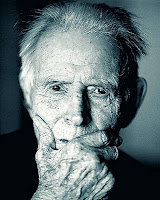








What a wonderfully civilized break - books, museums, family! Sorry to hear you're back-seating from ABBA, but if it leaves you more time for those other things, it's very wise.
I have a very good Polish friend who gave me that very same book of poems. Lovely stuff. I envy you that Eurostar and Brussels.
You are so right about a book needing to be read at the right time! Some lovely suggestions so thanks.
And - slightly sad sniff - I hope you enjoy your time away from ABBA in a really useful way and I'll look forward to seeing you in those other blogs.
What a coincidence, Adele! Thanks, Joan and Penny. Might even start a blog of my own... but does the world really need another writer's blog? Well, obviously it doesn't, but maybe I'll do it anyway!
Wow you have been busy reading - quite envious! And lovely to see a mention of The Flaxfield Quartet - I've been banging the drum for those for ages and am baffled why they aren't more widely known. And The Storm Bottle too - brilliant, and got me started on Nick's Cat Kin books which are fabulous ...
Yes lovely suggestions across the board. Thanks Liz. Sorry you are leaving even though not completely... as I always enjoy your insightful posts... but we'll hear from on on the History Girls still.